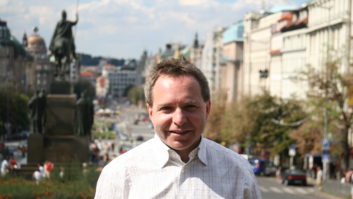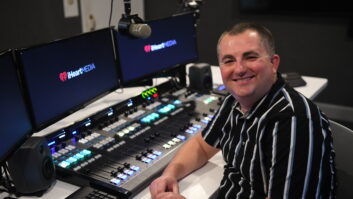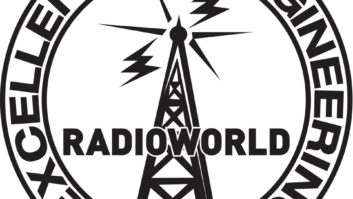
Gary Kline is senior vice president of engineering for Cumulus Media Inc. He is been intimately involved with the enormous growth of the group owner over the last several years. He took a few minutes out of his busy schedule to provide detailed answers to Five Questions.
TechBytes: Who are you and how did you get to where you are today?
Gary Kline: I’m a guy who grew up in New York City and was always fascinated by radio. I loved listening to radio programs from other states late at night and fell in love with the medium. Growing up listening to New York City radio in the ’70s and ’80s was what shaped my future and set me on radio career that continues today. That “hobby” and fascination led to making my own 8-track and cassette tapes pretending to be a DJ by the time I was 10. I still have a collection of 45s in my garage from those sessions.
By 13 I had my ham license and was playing with my first computer. By 17 I was applying for an internship at NBC/30 Rock in radio promotions department (I got it). By 18 I was hired as an engineer there and readying to go to college for a degree in business. I helped pay my way through school by being an on-air talent and ultimately becoming a radio engineer in the Midwest. By 21 I was working at ABC Radio News in Manhattan, which just a few years ago, I was reunited with when Cumulus purchased Citadel. It was heartwarming to work again with some of the folks I had known for so many years.
My entire career has been centered around radio, mostly engineering or engineering management but I have also been on-air, in general management, and programming. I started with Cumulus almost 16 years ago as a contractor/consultant and worked my way up the ladder, as they say. I am very driven, very much in love with our business, and never stopped wanting to learn more, do more, and improve upon the way we do things.
Things have changed since touching my first piece of tape on the 9th floor at 30 Rock and that’s required a constant process to stay ahead of the game — both from a technology and management standpoint. Transmitters and studios are just one mode of transmission these days. Streaming, video, web, satellite, etc. are all integral parts of the job. If I had stayed focused on just a few things I know I wouldn’t have the job I have today.
TechBytes: How has the broadcast engineering plant and practice changed since you started?
Kline: Well, as I was just saying in my response to the previous question, things have changed, a better word might be expanded, quite a bit. To be fair, some principles of broadcast engineering have remained the same. We generally have studios which feed transmitters which feed radios. But the gear we use, the method in which it is all connected, and the various transmission methods have changed dramatically. Almost all plants are digital or have some form of digital in them. Playback origination is almost entirely digital in nature. Audio routing and connectivity is going towards an IP based plant more and more every day.
At Cumulus our standard studio design calls for AOIP in every buildout. Transmitters are highly technical now with footprints way smaller than we could imagine — think 10 kW boxes in just a few rack spaces. Audio processing is so far advanced from what it was 30, 20, 10, even just five years ago. Engineers typically handle way more than they did before. That now includes, streaming, Web, sophisticated and integral IT support, video, complex live remotes, etc. When I started we used Martis for remotes. Today we use iPhones and 4G. We didn’t even have cellphones when I started.
Engineering overall has transitioned to more of a media engineering job. We manage media plants. We just completed a complete studio and facility buildout in downtown San Francisco. We’ve described our rack room there as a “data center” that passes audio.
TechBytes: Cumulus has been in acquisition mode over the last few years. Tell us about trying to get the disparate elements onto the same Cumulus engineering page.
Kline: This could be an article all on its own. I think the short answer is that we have strong systems in place. We have systems for management, for purchase approvals both operating and CapEx, for engineering management (i.e. a strong regional engineering team), for engineering standards, for vendor selection and interaction, etc. I would also say that we’ve done a number of acquisitions over the years both small/medium and large and have experience with what needs to happen: everything from back office to engineering, legal, diligence, etc. Good systems and back office structure goes a long way. We have standardized billing and CRM systems as well as music scheduling, automation, and HR applications. Couple that with strong engineering processes and the disparate elements come together.
Some things happen on Day One and others take more time. I am very respectful, in our engineering world, of the systems and methods another engineer may have put in place. If we acquire a cluster that’s had the same engineer for many years and he or she has their way of doing things, to the extent we can learn from them and tap into their knowledge, I am all for it. I and my team have learned an awful lot over the years by walking into rack rooms and studios and transmitters sites across the country. There’s lots of great innovation and creativity out there. We have high standards at Cumulus but that doesn’t mean everything must go. I think the combination of working standards and a seasoned plan of action along with a case by case review of the engineering in a particular market is what gets everyone on the same page.
TechBytes: Does Cumulus management provide enough resources for the engineering plant/do you have strong influence with corporate managers?
Kline: I report directly to Lew Dickey, our CEO. There is no red tape. There is no mid-level management. We roll our sleeves up every day and get down to work. I work hand-in-hand with the senior managers on the corporate team and I think it is fair to say we have a high degree of trust amongst each other as well as respect. There is a lot of responsibility that comes with sitting in this chair and there is equally a lot of responsibility in their respective chairs. I understand what our sales and revenue team as well as programming department must go through each day and I know how important it is to them that all of our signals operate at 100% every minute of every day. That includes not only our over-the-air signals but our streaming and satellite services under our Westwood One group.
I am based in Atlanta and, while I travel often, am here a few days each week. Every Friday I meet with the finance team. Every Monday I meet with the entire corporate programming department and go over any technical issues from their point of view listening to reports from every single station in the company. There are very few reported issues each week fortunately but this is an example of how we all work together.
You asked about strong influence. I think of it as strong relationships. If I need something done, I get it done with the help of my peers. And when someone needs something from me or my team, I am there for them. We communicate often, sometimes several times a day, to ensure things run smoothly and folks in the field get answers and the help they need. It is a constant process that requires focus every day of the week. The resources to get the job done are there. In this new economy, the key is to be creative and smart.
TechBytes: Where does Cumulus recruit its engineering talent from? Does Cumulus have any programs for the recruitment and training of young engineers?
Kline: Well, as everyone reading this knows, it is very hard to find unemployed top-notch engineering talent. They are not just sitting around. It takes effort and great networking. Luckily, I have engineers spread all over the country. Through that network we know of a lot of people and a lot of people know us. There’s also a strong pool of IT and tech-savvy prospects out there that we tap into when and where appropriate. You know the saying: “You should always be recruiting, even if you have no opening.” I am always recruiting. So are my team members. We have our eyes open all the time.
We also believe in promoting from within. We train constantly and have filled positions internally when possible. We’ve trained a number of our engineers on everything from RF maintenance to digital studio installs to network routing design. RF, digital, analog, Cisco, automation, desktop support, AOIP, live mixing, etc. We’ve kept the rental companies and airlines busy the past few years moving engineers around from one project to another for hands on learning as well.
I am on the national board of the SBE and believe strongly in their education programs and certification processes. I think that what Larry Wilkins (a former Cumulus engineer) is doing with the ABA [Alabama Broadcasters Association Engineering Academy] is magnificent. In fact, our newest engineering hire in Atlanta is attending class there as I write this — another promotion from within and from our promotions/remote department. We’ll turn him into a great staff engineer and hopefully someday, a great chief engineer.












